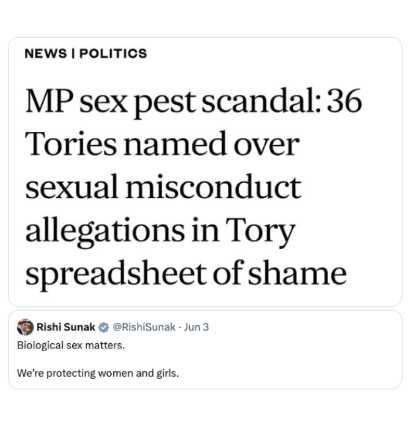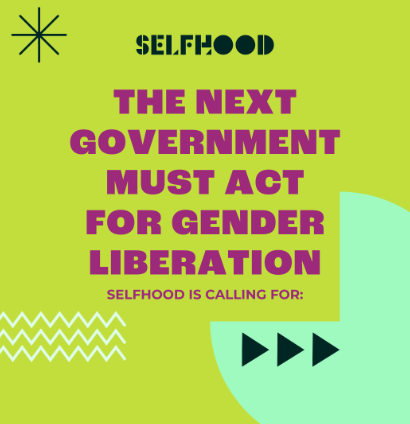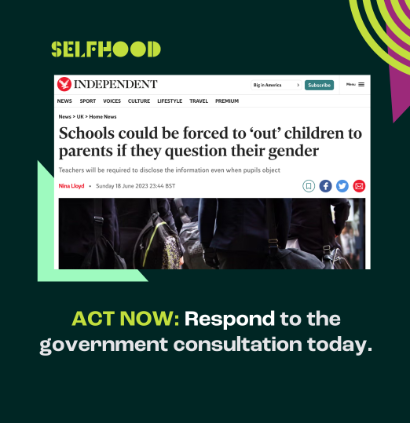“We Know What a Woman Is”: The Conservative Government’s legacy of violence against trans people

In recent years, the UK Government has weaponised policies around trans individuals, whipping up a toxic debate around gender that threatens to limit trans people and their ability to move freely and equally through the world. Under Rishi Sunak, the Conservative Government has made a series of legislative and policy moves that have significantly impacted the lives of transgender individuals, particularly trans and gender-diverse children and young people.
During this election period, we have already seen the ways in which this is set to continue.
This is part of a broader trend where trans rights are used as a political football, making a tiny minority of people hypervisible and subject to increased harassment and real world violence in the name of political point scoring. Political parties and high-profile public figures are attempting to position trans rights as a threat to traditional values of social norms. This fosters fear and division and ultimately distracts voters from issues that meaningfully affect them.
A particularly insidious tactic has been the exploitation of concerns around children's welfare. Policies are framed as protective measures for children, yet they ignore the voices and needs of trans youth, instead using them as political pawns. The consequences are severe: increased discrimination, violence, and marginalisation of the trans community. This blog outlines the legacy of violence against trans people from this Government.
Attacks on Schools
In December, the Government published a consultation on draft non-statutory guidance for schools and colleges in England on “gender questioning children”. This guidance mandates that schools should inform parents if a student expresses a desire to transition, regardless of the student's wishes and the potential risks to their safety. Selfhood responded to the consultation, pointing out that the guidance restricts children and young people's ability to explore and live authentically, particularly concerning their gender identity.
Last week, the Government issued a further consultation on draft RSHE guidance. This guidance severely limits schools' ability to decide with discretion what content is most needed for their cohort of students. It sets detailed age limits about when children can be taught RSHE topics and completely bans discussions of gender identity.
Attacks on Healthcare
In April, the Cass Review published its final report on gender identity services for children and young people. The report included troubling framing of cisgender identity as neutral and natural, while painting transition as an active and often negative intervention. This dichotomy fails to recognise the complexity of gender identity and ignores mounting evidence that gender-affirming care is a life-saving intervention for so many young people.
Even more worrying than the report itself is the way it has been misinterpreted by the Government to effectively ban the already limited healthcare options available for trans and gender-diverse children and young people. A few weeks ago, the Government introduced regulations to halt new private prescriptions of puberty blockers for under-18s in one of its final acts before the general election. This change was introduced by an emergency order, bypassing parliament.
Adding to these challenges, the government has proposed changes to the NHS Constitution, which sets out the principles and values of the NHS in England. Proposed changes included allowing patients to request the sex assigned at birth of their doctor. These proposals are pointless and virtually impossible to implement. Patients already have the right to request to be cared for by a doctor of the same gender, but all too often this doesn't happen. As of December 2023, there were 110,781 vacancies in secondary care in England.
Weaponisation of Single-Sex Spaces
A further proposed change to the NHS Constitution is to ban trans people from wards that align with their identity. The rationale for this proposal is that patients should be accommodated on single-sex wards to protect their safety. However, patients should already be accommodated on same-sex wards. The right to accommodation in a single-sex ward is already enshrined in the NHS constitution - the Government outlawed mixed wards in the NHS in 2010. But last year, NHS trusts broke this rule 44,000 times because appropriate beds weren't available. This is yet another example of the Government using trans people as a scapegoat for failures they have created. These proposals will do nothing to fix these issues and will serve only to further limit access to care for trans and non-binary patients, an already marginalised group with an acute need for more comprehensive and more compassionate care.
In a further attempt to weaponise trans rights, the Government recently proposed legislation in England to require new buildings to have single-sex toilets. This proposal isn’t positive for people of any gender. It is not illegal for people to use toilets designated for the opposite gender. The potential risk to women’s safety is therefore not ameliorated by segregated toilets.
But gender-neutral toilets can protect trans and non-binary people from discrimination. They also reduce waiting times for toilets for women. With the current most common bathroom design, women wait an average of six minutes to go while men wait just 11 seconds. Using gender-neutral design can reduce women’s waiting time to one minute 27 seconds. This proposal is all smoke and mirrors, to distract from the very real inequalities and barriers that many face trying to access public toilets.
Looking Ahead
As the UK approaches a general election, it is crucial for the incoming government to detoxify the debate around trans rights. Politicians and policymakers must move away from using trans issues as a political football and instead focus on creating inclusive and supportive environments for all citizens. This includes reversing harmful policies, ensuring access to gender-affirming healthcare, and protecting the rights and dignity of trans and gender diverse individuals in all aspects of life.
The next government has an opportunity to steer the country towards a more compassionate and equitable future. By prioritising the well-being of trans people and listening to the voices of those directly affected by these policies, the UK can begin to heal the divisions caused by the politicisation of trans rights. It is imperative that we elect leaders who will champion inclusivity and respect, ensuring that trans individuals are afforded the same rights and protections as everyone else.
Be notified when we add new articles
Popular blog posts
-

-

-
 The real-world manosphere 1 Dec 2023
The real-world manosphere 1 Dec 2023 -
 Cards Against Misogyny 27 Nov 2023
Cards Against Misogyny 27 Nov 2023

